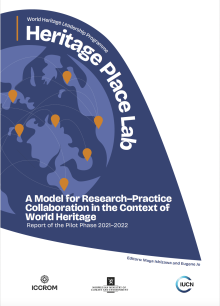
Report of the Pilot Phase 2021-2022
In May 2021, the ICCROM-IUCN World Heritage Leadership (WHL) programme launched the Heritage Place Lab (HPL), a new activity focused on strengthening networks across research and site management in the context of the implementation of the World Heritage Convention. In order to develop practice-led research agendas for World Heritage properties, the WHL invited researchers and site managers to team up in Research–-Practice Teams and take part in the HPL pilot phase, consisting of a series of six incubator online workshops held between September 2021 and April 2022. The expected outcomes of the HPL were that each Research–Practice Team would define a research agenda for one World Heritage property, and that the WHL, together with the research institutions and World Heritage properties involved, develop an umbrella research proposal and/or thematic research proposals that could be later used to apply for research funds.
This publication presents the process and results of the HPL pilot phase divided into two parts.
In the first part, the editors present the process proposed during the HPL, describing the conceptual framework and methods used during the incubator online workshops. The research–practice model tested during this pilot phase is detailed alongside the lessons learned during the experiment. A model that could be replicated at other World Heritage properties and heritage places is then proposed.
In the second part, the results of the HPL experimental process are discussed; seven practice-led research agendas are presented that showcase the collaborative work developed by the Research–Practice Teams involved in the process. The outcomes of the application of the model and methodology in the different regions and national contexts resulted in a diversity of proposals for research priorities at each of the World Heritage properties.
